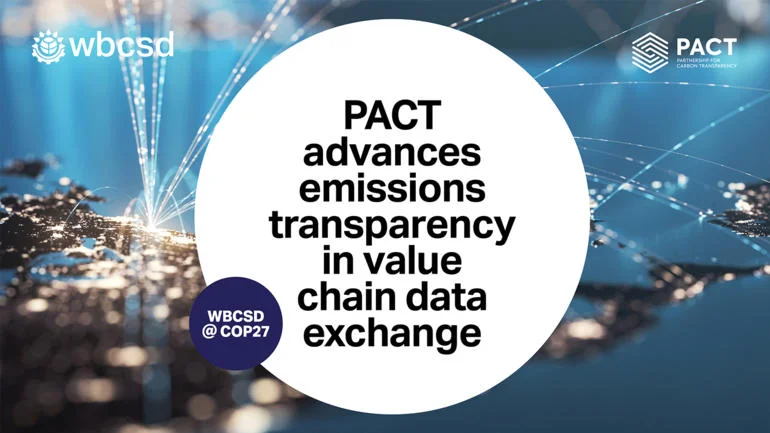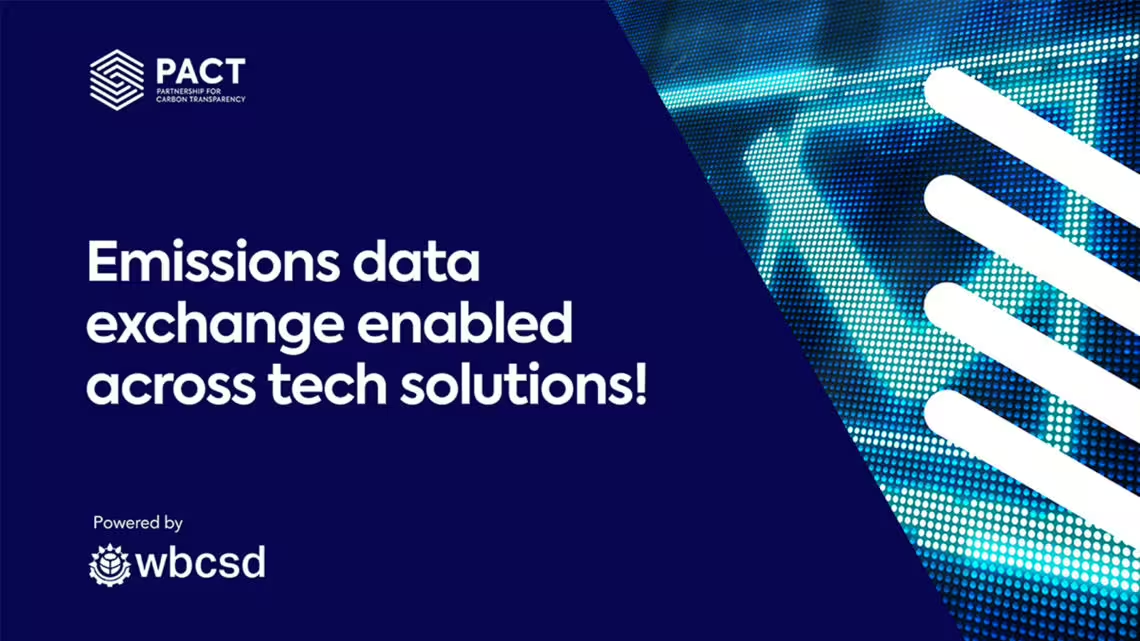New tech specifications will enable data exchange across different technology solutions
Geneva, 16 June 2022: The Partnership for Carbon Transparency (PACT), hosted by the World Business Council for Sustainable Development (WBCSD), has released the first set of technical specifications for the standardized exchange of carbon emissions data. The specifications will, for the first time, allow different emissions and accounting tech solutions to connect to and understand each other—making it easier for businesses to access data.
This is an important development on the journey to carbon transparency, which is fundamental in helping business to decarbonize, and follows the first exchange of data by PACT in April of this year. It sets the foundation for a harmonized data exchange system that fosters collaboration and integration across technology solutions and product value chains.
Organizations are increasingly recognizing the need to tackle their Scope 3 emissions, i.e., those that occur along a supply chain, yet many are still struggling to create sufficient transparency. A core hurdle is the difficulty in accessing data across the value chain. As a result, organizations are employing carbon accounting and emissions exchange technology solutions. While this constitutes an important step in the right direction, these solutions lack one essential feature: interoperability, i.e. the ability to connect to one another, exchange information and understand the information exchanged (or “speak the same language”). In practice, this means that any organization aiming to access data from its product value chain or a potential supplier has to use the same solution. This is akin to only being able to send emails to people using the same email provider—unimaginable.
The first PACT tech specifications—consisting of a data exchange protocol and data attributes—seek to resolve this challenge. The data exchange protocol enables solutions to connect to each other from a technology perspective. The data attributes, in turn, ensure data is formatted identically, enabling the data to be understood by different solutions. Ultimately, this reduces the risk of data remaining in (technical) siloes.
These tech specifications were recently tested in a pilot for the liquid laundry detergent value chain to ensure they achieve their objective. The pilot involved Aptar, BASF, Chevron, Dow, Solvay and Unilever, supported by the SINE Foundation as technology partner and McKinsey Sustainability as knowledge partner. Data was exchanged successfully using multiple different solutions currently under development by CircularTree, IBM, SAP and Siemens, reflecting the realities of how transparency will be created.
The specifications are the first cornerstone of the work PACT is doing to enable all organizations to exchange emissions data in a secure, peer-to-peer environment, regardless of the technology solution used. The resulting outcome will be known as the Pathfinder Network. Further details on the vision for the Network and the principles guiding its development can be found here. This progress will be complemented by an updated version of the Pathfinder Framework, which—following pilot testing and further extension—is set to be published in early 2023.
Based on the notion that no organization can create emissions transparency on its own, PACT is seeking to advance the agenda towards transparency by enabling collaboration and harmonization. Core deliverables are therefore publicly published and any organization aligned with the vision of PACT is encouraged to implement and apply these.
“We have collaborated with WBCSD in the Partnership for Carbon Transparency (PACT) framework, which is aligned with Aptar’s vision and ambition to progress towards decarbonization. The set of technical specifications for the standardized exchange of carbon emissions data facilitates collaboration and integration across product value chains.”— Christophe Marie, Global Product Sustainability Director, Aptar
“As BASF, we are sharing our know-how on determining the carbon footprint of products and being a value chain partner to almost all industries, BASF needs a harmonized data exchange eco-system, which fosters collaboration and integration across technology solutions and product value chains. This is the great achievement of PACT, because only with the correct information at hand can we take effective action.” — Christoph Jaekel, VP Corporate Sustainability, BASF
“Dow is pleased to engage with our upstream and downstream supply chain partners to demonstrate that transparency in supply chain carbon emissions is possible in a robust and credible way. This pilot demonstrates one small step in a larger effort to digitize climate data, enabling us to better track progress towards our climate goals.” — Leticia Jensen, Global Purchasing Director for ESG, Sustainability and Supplier Diversity & Lead of Scope 3 Program, Dow
“Product carbon footprint measurement and sharing is essential to reach net zero emissions. The WBCSD PACT is a foundation to create a collaborative ecosystem allowing carbon emissions data to be shared along our value chains. We are very happy to contribute to create the necessary architecture based on concrete feedback. At Solvay, our intent is to shape sustainable solutions to face the planet’s challenges. Digital Technologies are our catalyst to achieve this ambition faster and more efficiently.” — Pascal Chalvon Demersay, Chief Sustainability & Government Affairs Officer, Solvay
“The creation of the Pathfinder Network is essential in enabling Unilever to exchange standardized emissions data at scale with our suppliers, independent of everyone’s choice of technology solutions. We are committed to increased supply chain transparency and view it as a key enabler for consumers to be able to make more informed and sustainable choices. Being part of the first pilot for the exchange of emissions data across a value chain has proved again the potential of the collaborative approach of PACT and the opportunities such a Network will create for us” —Reginaldo Ecclissato, Chief Supply Chain & Business Operations Officer, Unilever
Additional details on PACT can be found here. For further information, please contact anna.stanley@wbcsd.org.
Related
Content

Accelerate sustainable mobility in your city: the Corporate Mobility Pact (CMP) initiative
1 July, 2020

New Partnership for Carbon Transparency provides forum for stakeholders to address lack of Scope 3 emissions transparency
16 June, 2021

Partnership for Carbon Transparency (PACT) advances emissions transparency with breakthrough in value chain data exchange
11 November, 2022
